- Home
- Iain M. Banks
Consider Phlebas
Consider Phlebas Read online
Consider Phlebas first published in 1987
* * *
The war raged across the galaxy. Billions had died, billions more were doomed. Moons, planets, the very stars themselves, faced destruction, cold-blooded, brutal, and worse, random. The Idirans fought for their Faith; the Culture for its moral right to exist. Principles were at stake. There could be no surrender.
Within the cosmic conflict, an individual crusade. Deep within a fabled labyrinth on a barren world, a Planet of the Dead proscribed to mortals, lay a fugitive Mind. Both the Culture and the Idirans sought it. It was the fate of Horza, the Changer, and his motley crew of unpredictable mercenaries, human and machine, actually to find it, and with it their own destruction.
* * *
CONTENTS
(Quotations)
Prologue
1. Sorpen
2. The Hand of God 137
3. Clear Air Turbulence
4. Temple of Light
State of play: one
5. Megaship
6. The Eaters
Interlude in darkness
7. A Game of Damage
8. The Ends of Invention
State of play: two
9. Schar’s World
10. The Command System: Batholith
State of play: three
11. The Command System: Stations
12. The Command System: Engines
13. The Command System: Terminus
14. Consider Phlebas
Appendices: the Idiran–Culture war
Reasons: the Culture
Reasons: the Idirans
The war, briefly
Dramatis personae
Epilogue
* * *
REVISION HISTORY
4.0: Previous version didnt play nice with the Kindle so merged all the separate files into one, fixed the TOC, remove nav links from every page
* * *
Idolatry is worse than carnage.
The Koran, 2: 190
Gentile or Jew
O you who turn the wheel and look to windward,
Consider Phlebas, who was once handsome and tall as you.
T. S. Eliot,
‘The Waste Land’, IV
Prologue
The ship didn’t even have a name. It had no human crew because the factory craft which constructed it had been evacuated long ago. It had no life-support or accommodation units for the same reason. It had no class number or fleet designation because it was a mongrel made from bits and pieces of different types of warcraft; and it didn’t have a name because the factory craft had no time left for such niceties.
The dockyard threw the ship together as best it could from its depleted stock of components, even though most of the weapon, power and sensory systems were either faulty, superseded or due for overhaul. The factory vessel knew that its own destruction was inevitable, but there was just a chance that its last creation might have the speed and the luck to escape.
The one perfect, priceless component the factory craft did have was the vastly powerful – though still raw and untrained – Mind around which it had constructed the rest of the ship. If it could get the Mind to safety, the factory vessel thought it would have done well. Nevertheless, there was another reason – the real reason – the dockyard mother didn’t give its warship child a name; it thought there was something else it lacked: hope.
The ship left the construction bay of the factory craft with most of its fitting-out still to be done. Accelerating hard, its course a four-dimensional spiral through a blizzard of stars where it knew that only danger waited, it powered into hyperspace on spent engines from an overhauled craft of one class, watched its birthplace disappear astern with battle-damaged sensors from a second, and tested outdated weapon units cannibalised from yet another. Inside its warship body, in narrow, unlit, unheated, hard-vacuum spaces, constructor drones struggled to install or complete sensors, displacers, field generators, shield disruptors, laserfields, plasma chambers, warhead magazines, manoeuvring units, repair systems and the thousands of other major and minor components required to make a functional warship. Gradually, as it swept through the vast open reaches between the star systems, the vessel’s internal structure changed, and it became less chaotic, more ordered, as the factory drones completed their tasks.
Several tens of hours out on its first journey, while it was testing its track scanner by focusing back along the route it had taken, the ship registered a single massive annihilation explosion deep behind it, where the factory craft had been. It watched the blossoming shell of radiation expand for a while, then switched the scanner field to dead ahead and pushed yet more power through its already overloaded engines.
The ship did all it could to avoid combat; it kept well away from the routes enemy craft would probably use; it treated every hint of any craft as a confirmed hostile sighting. At the same time, as it zigzagged and ducked and weaved and rose and fell, it was corkscrewing as fast as it could, as directly as it dared, down and across the strand of the galactic arm in which it had been born, heading for the edge of that great isthmus and the comparatively empty space beyond. On the far side, on the edge of the next limb, it might find safety.
Just as it arrived at that first border, where the stars rose like a glittering cliff alongside emptiness, it was caught.
A fleet of hostile craft, whose course by chance came close enough to that of the fleeing ship, detected its ragged, noisy emission shell, and intercepted it. The ship ran straight into their attack and was overwhelmed. Out-armed, slow, vulnerable, it knew almost instantly that it had no chance even of inflicting any damage on the opposing fleet.
So it destroyed itself, detonating the stock of warheads it carried in a sudden release of energy which for a second, in hyperspace alone, outshone the yellow dwarf star of a nearby system.
Scattered in a pattern around it, an instant before the ship itself was blown into plasma, most of the thousands of exploding warheads formed an outrushing sphere of radiation through which any escape seemed impossible. In the fraction of a second the entire engagement lasted, there were at the end some millionths when the battle-computers of the enemy fleet briefly analysed the four-dimensional maze of expanding radiation and saw that there was one bewilderingly complicated and unlikely way out of the concentric shells of erupting energies now opening like the petals of some immense flower between the star systems. It was not, however, a route the Mind of a small, archaic warship could plan for, create and follow.
By the time it was noticed that the ship’s Mind had taken exactly that path through its screen of annihilation, it was too late to stop it from falling away through hyperspace towards the small, cold planet fourth out from the single yellow sun of the nearby system.
It was also too late to do anything about the light from the ship’s exploding warheads, which had been arranged in a crude code, describing the vessel’s fate and the escaped Mind’s status and position, and legible to anybody catching the unreal light as it sped through the galaxy. Perhaps worst of all – and had their design permitted such a thing, those electronic brains would now have felt dismay – the planet the Mind had made for through its shield of explosions was not one they could simply attack, destroy or even land on; it was Schar’s World, near the region of barren space between two galactic strands called the Sullen Gulf, and it was one of the forbidden Planets of the Dead.
1.
Sorpen
The level was at his top lip now. Even with his head pressed hard back against the stones of the cell wall his nose was only just above the surface. He wasn’t going to get his hands free in time; he was going to drown.
In the darkness of the cell, in its stink and warmth, while the sweat ran over his brows and tightly
closed eyes and his trance went on and on, one part of his mind tried to accustom him to the idea of his own death. But, like an unseen insect buzzing in a quiet room, there was something else, something that would not go away, was of no use, and only annoyed. It was a sentence, irrelevant and pointless and so old he’d forgotten where he had heard or read it, and it went round and round the inside of his head like a marble spun round the inside of a jug:
The Jinmoti of Bozlen Two kill the hereditary ritual assassins of the new Yearking’s immediate family by drowning them in the tears of the Continental Empathaur in its Sadness Season.
At one point, shortly after his ordeal had begun and he was only part-way into his trance, he had wondered what would happen if he threw up. It had been when the palace kitchens – about fifteen or sixteen floors above, if his calculations were correct – had sent their waste down the sinuous network of plumbing that led to the sewercell. The gurgling, watery mess had dislodged some rotten food from the last time some poor wretch had drowned in filth and garbage, and that was when he felt he might vomit. It had been almost comforting to work out that it would make no difference to the time of his death.
Then he had wondered – in that state of nervous frivolity which sometimes afflicts those who can do nothing but wait in a situation of mortal threat – whether crying would speed his death. In theory it would, though in practical terms it was irrelevant; but that was when the sentence started to roll round in his head.
The Jinmoti of Bozlen Two kill the hereditary ritual . . .
The liquid, which he could hear and feel and smell all too clearly – and could probably have seen with his far from ordinary eyes had they been open – washed briefly up to touch the bottom of his nose. He felt it block his nostrils, filling them with a stench that made his stomach heave. But he shook his head, tried to force his skull even further back against the stones, and the foul broth fell away. He blew down and could breathe again.
There wasn’t long now. He checked his wrists again, but it was no good. It would take another hour or more, and he had only minutes, if he was lucky.
The trance was breaking anyway. He was returning to almost total consciousness, as though his brain wanted fully to appreciate his own death, its own extinction. He tried to think of something profound, or to see his life flash in front of him, or suddenly to remember some old love, a long-forgotten prophecy or premonition, but there was nothing, just an empty sentence, and the sensations of drowning in other people’s dirt and waste.
You old bastards, he thought. One of their few strokes of humour or originality had been devising an elegant, ironic way of death. How fitting it must feel to them, dragging their decrepit frames to the banquet-hall privies, literally to defecate all over their enemies, and thereby kill them.
The air pressure built up, and a distant, groaning rumble of liquid signalled another flushing from above. You old bastards. Well, I hope at least you kept your promise, Balveda.
The Jinmoti of Bozlen Two kill the hereditary ritual . . . thought one part of his brain, as the pipes in the ceiling spluttered and the waste splashed into the warm mass of liquid which almost filled the cell. The wave passed over his face, then fell back to leave his nose free for a second and give him time to gulp a lungful of air. Then the liquid rose gently to touch the bottom of his nose again, and stayed there.
He held his breath.
It had hurt at first, when they had hung him up. His hands, tied inside tight leather pouches, were directly above his head, manacled inside thick loops of iron bolted to the cell walls, which took all his weight. His feet were tied together and left to dangle inside an iron tube, also attached to the wall, which stopped him from taking any weight on his feet and knees and at the same time prevented him from moving his legs more than a hand’s breadth out from the wall or to either side. The tube ended just above his knees; above it there was only a thin and dirty loincloth to hide his ancient and grubby nakedness.
He had shut off the pain from his wrists and shoulders even while the four burly guards, two of them perched on ladders, had secured him in place. Even so he could feel that niggling sensation at the back of his skull which told him that he ought to be hurting. That had lessened gradually as the level of waste in the small sewercell had risen and buoyed up his body.
He had started to go into a trance then, as soon as the guards left, though he knew it was probably hopeless. It hadn’t lasted long; the cell door opened again within minutes, a metal walkway was lowered by a guard onto the damp flagstones of the cell floor, and light from the corridor washed into the darkness. He had stopped the Changing trance and craned his neck to see who his visitor might be.
Into the cell, holding a short staff glowing cool blue, stepped the stooped, grizzled figure of Amahain-Frolk, security minister for the Gerontocracy of Sorpen. The old man smiled at him and nodded approvingly, then turned to the corridor and, with a thin, discoloured hand, beckoned somebody standing outside the cell to step onto the short walkway and enter. He guessed it would be the Culture agent Balveda, and it was. She came lightly onto the metal boarding, looked round slowly, and fastened her gaze on him. He smiled and tried to nod in greeting, his ears rubbing on his naked arms.
‘Balveda! I thought I might see you again. Come to see the host of the party?’ He forced a grin. Officially it was his banquet; he was the host. Another of the Gerontocracy’s little jokes. He hoped his voice had shown no signs of fear.
Perosteck Balveda, agent of the Culture, a full head taller than the old man by her side and still strikingly handsome even in the pallid glow of the blue torch, shook her thin, finely made head slowly. Her short, black hair lay like a shadow on her skull.
‘No,’ she said, ‘I didn’t want to see you, or say goodbye.’
‘You put me here, Balveda,’ he said quietly.
‘Yes, and there you belong,’ Amahain-Frolk said, stepping as far forward on the platform as he could without overbalancing and having to step onto the damp floor. ‘I wanted you tortured first, but Miss Balveda here’ – the minister’s high, scratchy voice echoed in the cell as he turned his head back to the woman – ‘pleaded for you, though God knows why. But that’s where you belong all right; murderer.’ He shook the staff at the almost naked man hanging on the dirty wall of the cell.
Balveda looked at her feet, just visible under the hem of the long, plain grey gown she wore. A circular pendant on a chain around her neck glinted in the light from the corridor outside. Amahain-Frolk had stepped back beside her, holding the shining staff up and squinting at the captive.
‘You know, even now I could almost swear that was Egratin hanging there. I can . . .’ He shook his gaunt, bony head. ‘. . . I can hardly believe it isn’t, not until he opens his mouth, anyway. My God, these Changers are dangerous frightening things!’ He turned to Balveda. She smoothed her hair at the nape of her neck and looked down at the old man.
‘They are also an ancient and proud people, Minister, and there are very few of them left. May I ask you one more time? Please? Let him live. He might be—’
The Gerontocrat waved a thin and twisted hand at her, his face distorting in a grimace. ‘No! You would do well, Miss Balveda, not to keep asking for this . . . this assassin, this murderous, treacherous . . . spy, to be spared. Do you think we take the cowardly murder and impersonation of one of our Outworld ministers lightly? What damage this . . . thing could have caused! Why, when we arrested it two of our guards died just from being scratched! Another is blind for life after this monster spat in his eye! However,’ Amahain-Frolk sneered at the man chained to the wall, ‘we took those teeth out. And his hands are tied so that he can’t even scratch himself.’ He turned to Balveda again. ‘You say they are few? I say good; there will soon be one less.’ The old man narrowed his eyes as he looked at the woman. ‘We are grateful to you and your people for exposing this fraud and murderer, but do not think that gives you the right to tell us what to do. There are some in the Gerontocracy who want n
othing to do with any outside influence, and their voices grow in volume by the day as the war comes closer. You would do well not to antagonise those of us who do support your cause.’
Balveda pursed her lips and looked down at her feet again, clasping her slender hands behind her back. Amahain-Frolk had turned back to the man hanging on the wall, wagging the staff in his direction as he spoke. ‘You will soon be dead, impostor, and with you die your masters’ plans for the domination of our peaceful system! The same fate awaits them if they try to invade us. We and the Culture are—’
He shook his head as best he could and roared back, ‘Frolk, you’re an idiot!’ The old man shrank away as though hit. The Changer went on, ‘Can’t you see you’re going to be taken over anyway? Probably by the Idirans, but if not by them then by the Culture. You don’t control your own destinies any more; the war’s stopped all that. Soon this whole sector will be part of the front, unless you make it part of the Idiran sphere. I was only sent in to tell you what you should have known anyway – not to cheat you into something you’d regret later. For God’s sake, man, the Idirans won’t eat you—’
‘Ha! They look as though they could! Monsters with three feet; invaders, killers, infidels . . . You want us to link with them? With three-strides tall-monsters? To be ground under their hooves? To have to worship their false gods?’
‘At least they have a God, Frolk. The Culture doesn’t.’ The ache in his arms was coming back as he concentrated on talking. He shifted as best he could and looked down at the minister. ‘They at least think the same way you do. The Culture doesn’t.’
‘Oh no, my friend, oh no.’ Amahain-Frolk held one hand up flat to him and shook his head. ‘You won’t sow seeds of discord like that.’

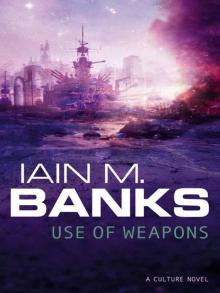 Use of Weapons
Use of Weapons Transition
Transition The Crow Road
The Crow Road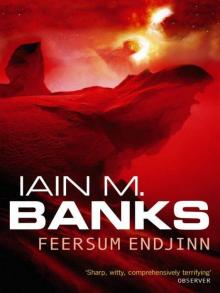 Feersum Endjinn
Feersum Endjinn Matter
Matter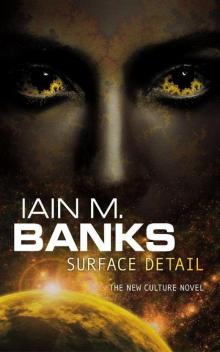 Surface Detail
Surface Detail The Wasp Factory
The Wasp Factory Consider Phlebas
Consider Phlebas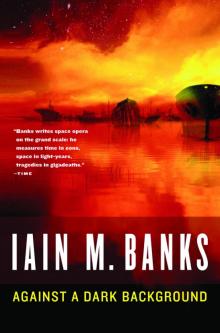 Against a Dark Background
Against a Dark Background Excession
Excession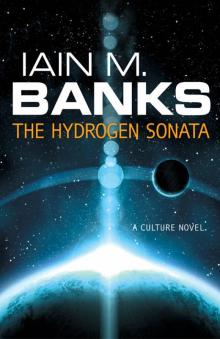 The Hydrogen Sonata
The Hydrogen Sonata The Algebraist
The Algebraist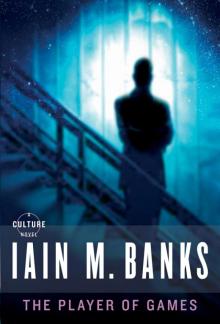 The Player of Games
The Player of Games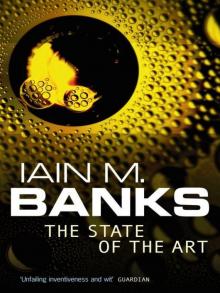 The State of the Art
The State of the Art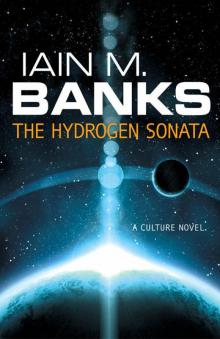 The Hydrogen Sonata c-10
The Hydrogen Sonata c-10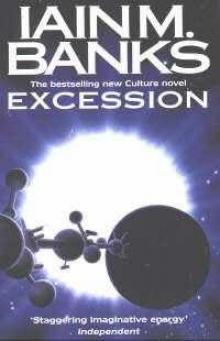 Excession c-5
Excession c-5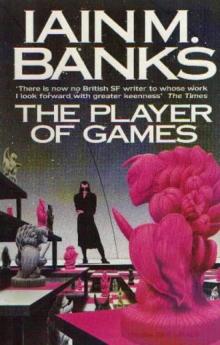 The Player of Games c-2
The Player of Games c-2 Matter c-8
Matter c-8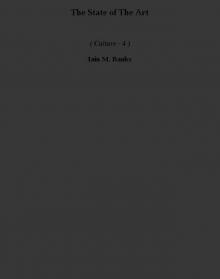 The State of The Art c-4
The State of The Art c-4 Look to Windward c-7
Look to Windward c-7 Consider Phlebas c-1
Consider Phlebas c-1